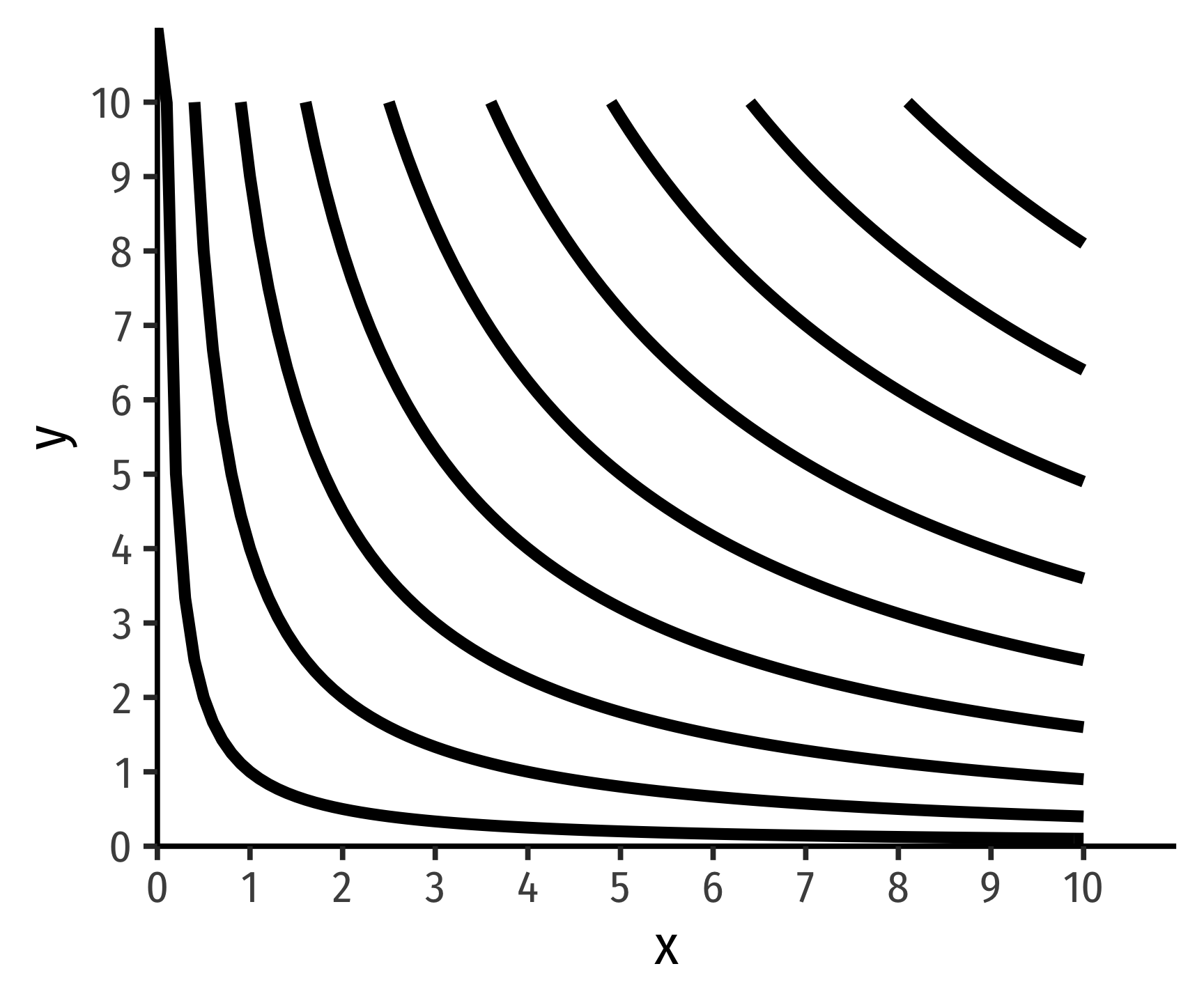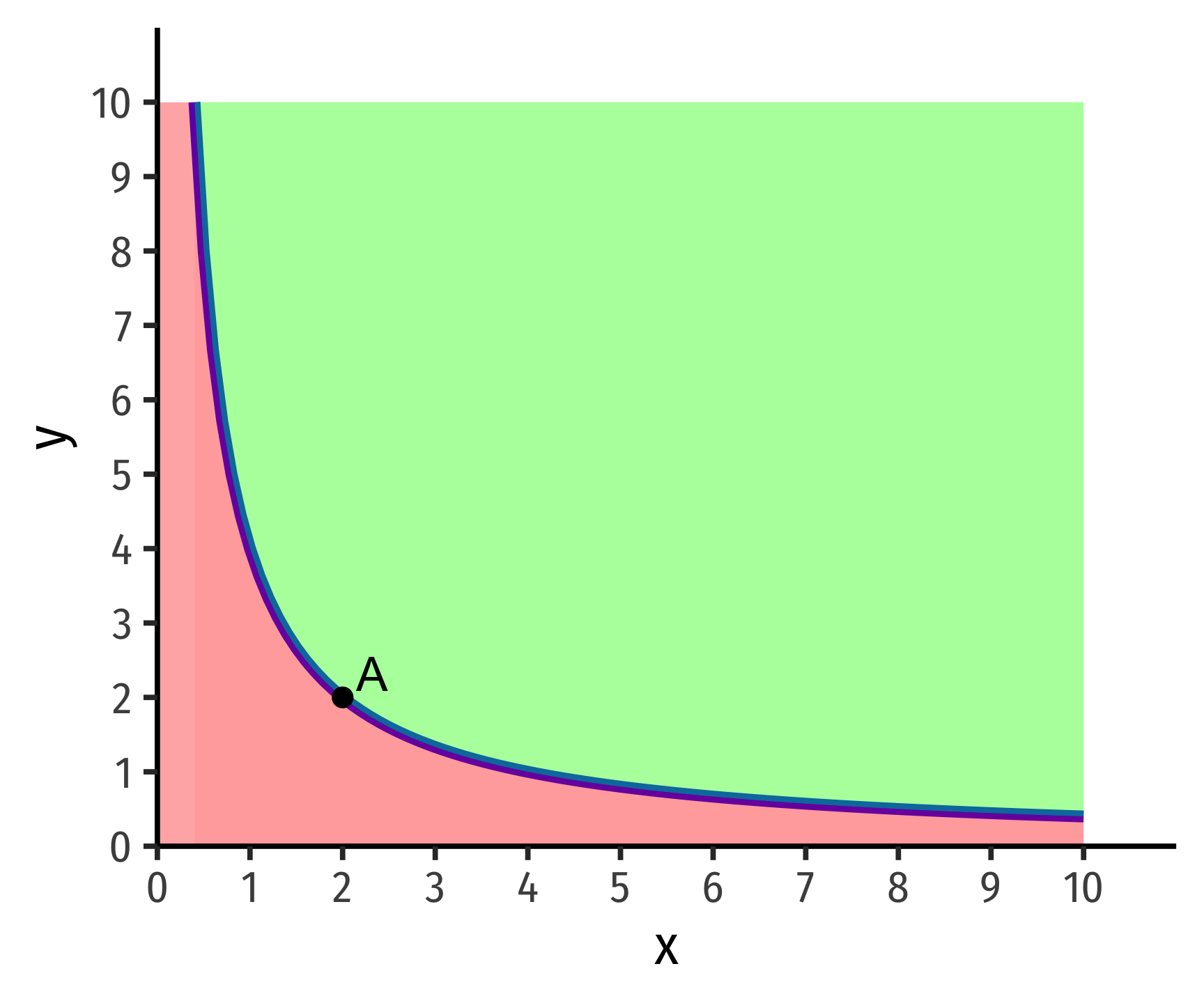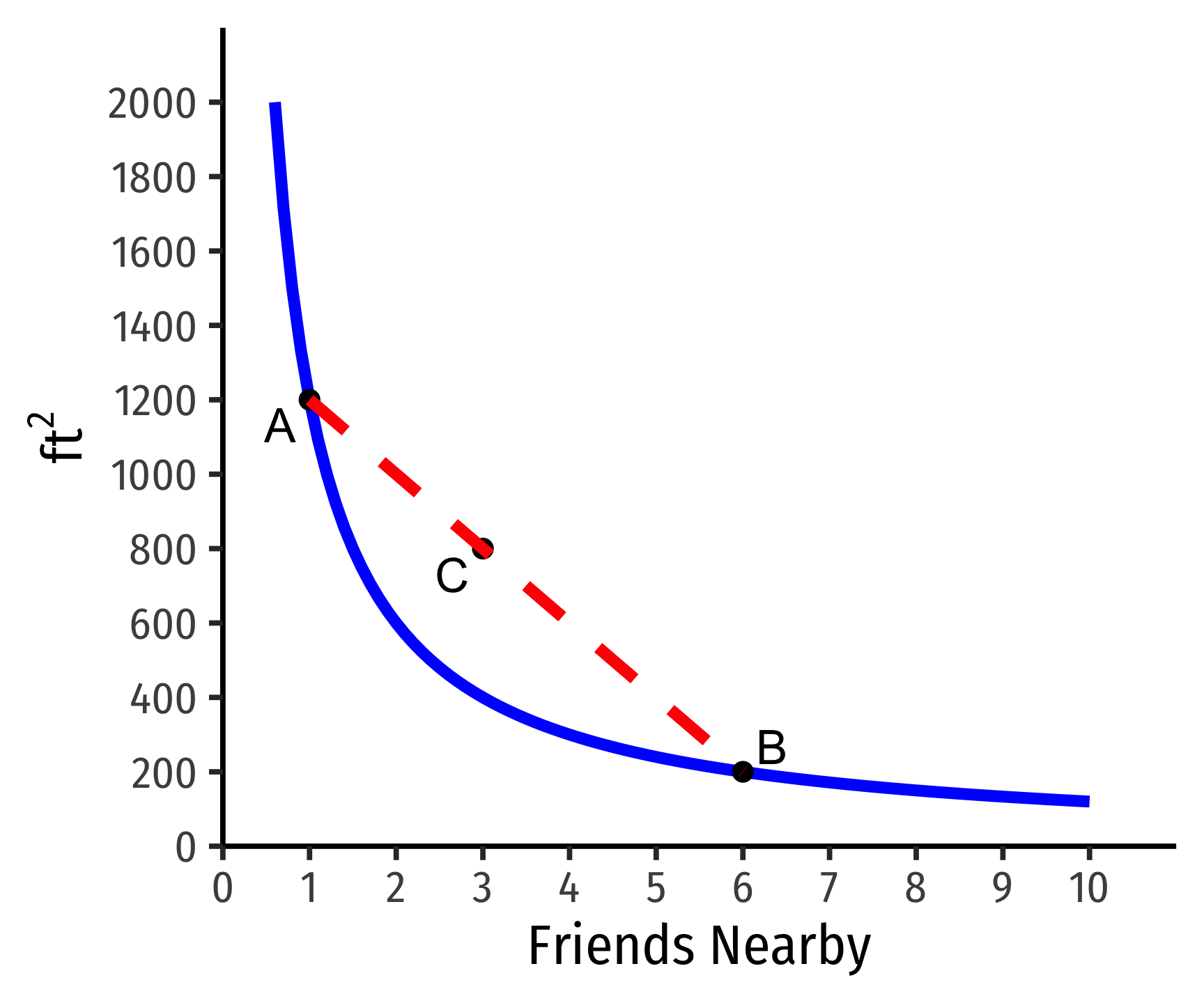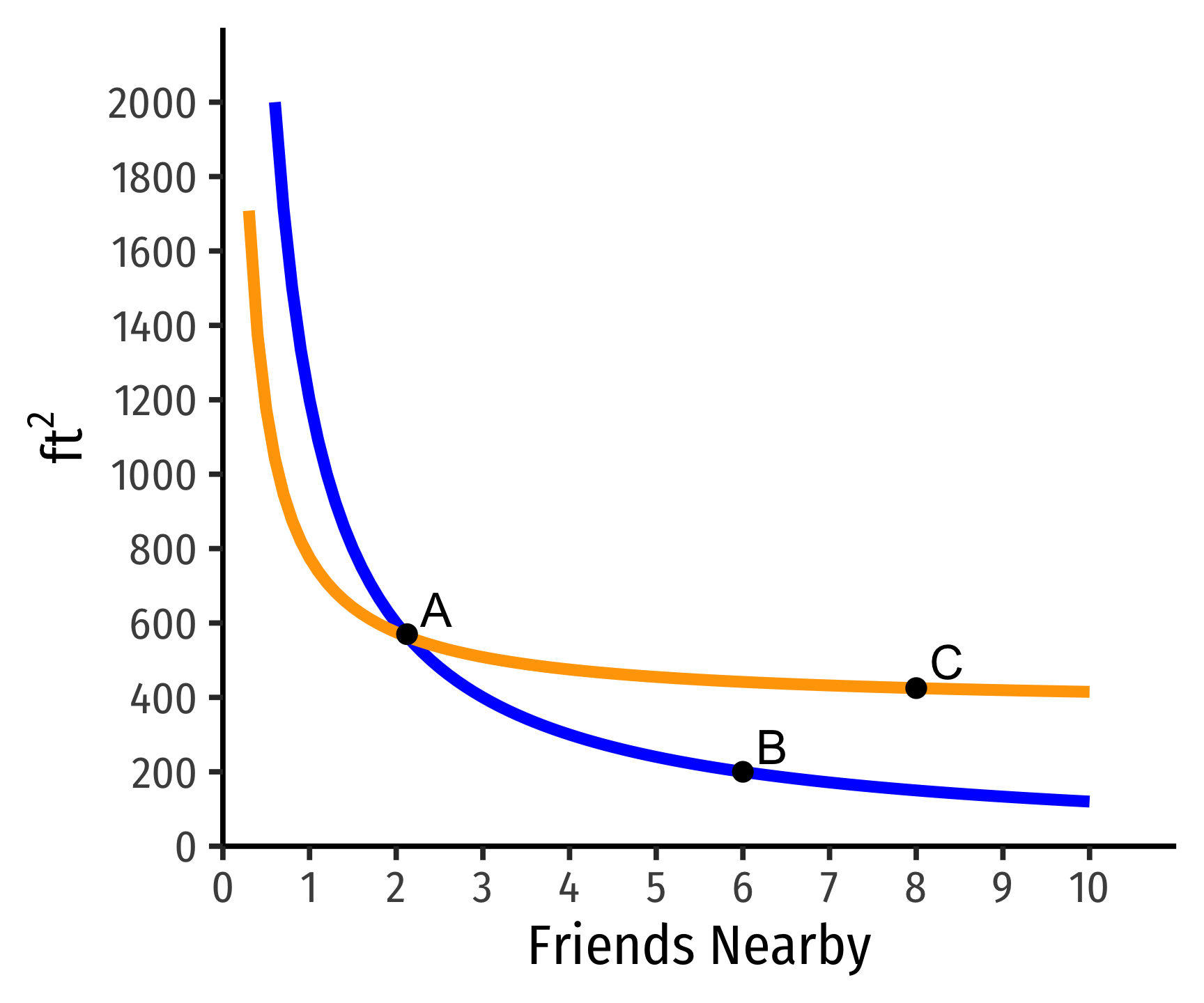Overview
From last class, we know what constraints individuals face in the market (represented by the budget constraint), but how do people make the choices they do? We must now enter the more controversial — though still the overwhelming consensus view in economics — realm of modeling preferences.
As I mentioned in last class’ page, a lot of the “in the weeds” details about preference assumptions, indifference curves, and utility functions are a waste of your time. If you look at the textbook chapter, I am skipping a lot of “the fat,” and relegating it to an appendix at the bottom of this page. I used to spend an entire week just teaching about preferences. Again, I reiterate that if you are interested in more advanced economics training, it is essential that you master all of these details. But not for this course.
Today we focus on the essential tools for fitting preferences into our optimization model:
- indifference curves: each of which is the set of all bundles that one is indifferent between (and that give the same amount utility)
- utility functions: which measure the ordinal (but not cardinal!) utility level of any given bundle; for comparisons only!
- marginal rate of substitution: the slope of the indifference curve, representing an individual’s subjective tradeoff between goods; measured by the ratio of marginal utilities:
Readings
- Ch. 4.1-4.2 in Goolsbee, Levitt, and Syverson, 2019
- Math Review Guide
Practice
Answers from last class’ practice problems are posted on that page.
Slides
Below, you can find the slides in two formats. Clicking the image will bring you to the html version of the slides in a new tab. Note while in going through the slides, you can type h to see a special list of viewing options, and type o for an outline view of all the slides.
The lower button will allow you to download a PDF version of the slides. I suggest printing the slides beforehand and using them to take additional notes in class (not everything is in the slides)!
Strict vs. Weak Preferences
We have defined preferences as being strictly one of the following possibilities:
- ( is strictly preferred over b)
- ( is strictly preferred over a)
- (indifferent between a)
You can also have weak preferences, such as
- ( is at least as preferred as (or “weakly preferred over” )
- ( is at least as preferred as (or “weakly preferred over” )
These are more technically complete, but it is much more simple for us to focus on strong preferences, and we don’t lose much by doing so.
Assumptions of “Well-behaved Preferences”
Reflexivity : any bundle is at least as preferred as itself
Completeness : any two bundles can be compared
Transitivity : rankings are logically consistent:
- If and , then
Are these good assumptions? As you will find typical in economics, very often yes, sometimes no! See the growing field of Behavioral economics for interesting anomalies and exceptions to our assumptions.
Assumptions of “Well-behaved Indifference Curves”
Like preferences, we make 4 major assumptions about indifference curves to describe the normal case. In fact, many of these assumptions are derived from the assumptions we made above about well-behaved preferences
- We can always draw indifference curves: two bundles can always be ranked
Every possible bundle (point on graph) is on an indifference curve.

Of course, this means that this entire graph is full of indifference curves - every single possible point is on some indifference curve (and this whole graph would just be a solid block of black). Naturally, it’s pointless to draw all the indifference curves, we just want to show a few to make our analysis meaningful. But the general idea comes from assumption 2 of preferences: any two bundles can be compared, as we can compare two points on this graph and make a judgment.
- Indifference curves are monotonic, which means practically that “more is preferred to less”
For any bundle with more of at least one good than bundle . Movements to the Northeast always preferable, while movements to the Southwest always unpreferable.

Here’s a challenge: what would indifference curves look like if one of the axes contained a bad, rather than a good? In this case, we would violate the assumption of monotonicity!
- Indifference curves are convex, which means in practice that “averages are preferred to extremes”
From experience, people generally prefer variety in their consumption. Rather than having one bundle that is “extreme” (a lot of one good and little or none of another), they tend to prefer a bundle with a better “mix” or “balance” of some of both goods.
Take our example from class, hunting for apartments. Apartment is very large but near very few friends, whereas apartment is very small but near many friends. If we could find some apartment, , that is a weighted average of the two, with a better mix of size and friends, it would be preferred, and thus, on a higher indifference curve than or !
Mathematically, this feature is because indifference curves are normally convex. A function is convex when a line connecting any two points on the function lies above the function itself. Check the math review guide for more information.

Here’s a challenge: what would non-convex (e.g. concave) curves look like, and what preferences would cause that situation?
- Indifference curves can never cross because we have assumed that preferences are transitive.
Suppose two curves crossed, as the ones below:
- On the blue indifference curve, \\(A \sim B\\)
- On the orange indifference curve \\(B \sim C\\)
- But clearly \\(C\\) .\\(B\\)
- Preferences are not transitive!

Steepness & Indifference Curves for Neutrals
The Steepness of indifference curves tells us how consumers trade off between goods.

Perfectly vertical curves (left) indifference between having more (point B) or fewer (point A) downloads. There is no tradeoff a person would make to acquire more Downloads, they truly do not care about them at all. Thus, on the left graph, Downloads would be a neutral.
Perfectly horizontal curves (right) indifference between having more (point B) or fewer (point A) Tickets. There is no tradeoff a person would make to acquire more Tickets, they truly do not care about them at all. Thus, on the right graph, Tickets would be a neutral.
We can look at less extreme cases:

On the left graph, the flatter curve implies the person is willing to give up only a few Downloads to obtain more Tickets (and vice versa). (slope) is small, indicating downloads are more highly valued relative to tickets.
On the right graph, the steeper curve implies the person is willing to give up a lot Downloads to obtain more Tickets (and vice versa). (slope) is large, indicating downloads are less valued relative to tickets.
Math Appendix
Derivation of MRS Equation (as ratio of marginal utilities)
Consider a movement along an indifference curve, how would this change affect utility? There will be a change in and a change in , and multiplying the marginal utility of each, and adding these together will give us our total change in utility. But we know that if we are on the same indifference curve, moving along the curve will not change utility (all points on the curve are defined as having the same utility!). So rearrange the equation as follows:
Notice rise over run, , is the slope, which we have defined as the marginal rate of substitution (MRS).
Utility Functions and PMTs
Two utility functions and represent the same preferences iff there is a strictly increasing function such that
The following utility functions express the same preferences:
A positive monotonic transformation (PMT) transforms quantities such that the rank order of the quantities is preserved.
- Examples:
Any PMT of a utility function contains the same preferences!
Graphing Indifference Curves
I will not ask you to formally graph indifference curves (just roughly sketch them where appropriate). If you wanted to graph them, and express them in a graphable (slope-intercept form) equation, simply solve for the good on the vertical axis.
Example: Suppose we have a typical1 indifference curve for apples and bananas :
Each indifference curve (or contour) is one level of utility (all points on the curve give a specific level of utility). So, set that level of utility equal to some constant, .
Then, if we are putting on the vertical axis, we simply solve this for :
This is the general equation for all indifference curves of this utility function: each utility level (value of can be graphed as an indifference curve with that equation. Thus, for example, for a utility level of , the equation for that indifference curve is .

Utility Functions for Perfect Substitutes
Perfect substitutes produce straight lines for indifference curves. A straight line has a constant slope, which is interpretted as the MRS being constant - you should always be willing to substitute between the two goods at the same rate. The utility function looks like:
Where each is a relative weight (intensity of relative preference). These are often known as linear preferences because the utility of the two goods are related by addition.
Notice, having some of one good and none of the other still provides positive utility (unlike utility functions where the quantities of goods are multiplied!). This is precisely because of the substitutability between the goods!
Example
Consider 1-Liter bottles of Coke and 2-Liter bottles of Coke . You should always be willing to substitute between one 2-Liter bottle and two 1-Liter bottles.
The relative weights here are 1 for 1-Liter bottles and 2 for 2-Liter bottles, because 2-Liter bottles are “worth” twice as much for you (it takes two 1-Liter bottles to match a 2-Liter bottle!).

Utility Functions for Perfect Complements
Perfect complements produce right angles for indifference curves. This is technically not a mathematical function, since each value must be mapped to a single value (i.e. no vertical lines). Thus, the utility function for perfect complements and is quite unique:
Where each is a relative weight (intensity of relative preference). Utility is determined by the lesser value of what you have, (weighted by ) or (weighted by ). These are sometimes called “Leontief preferences”.
The marginal rate of substitution alternates between (horizontal line) and (vertical line).
Cobb-Douglas Functions
Cobb-Douglas functions (both for utility and production) are one of the most common functional forms in economics. Despite their somewhat frightening presence on the surface, they have very neat mathematical properties, and have been empirically useful as well. A Cobb-Douglas function (for utility) looks like:
MRS and Positive Monotonic Transformations
The marginal rate of substitution, using the above equation is:
Using logarithms, we can take a positive monotonic transformation of the original utility function :
The MRS using the logarithmic form is:
Which of course, is the same, because we know any positive monotonic transformation of a utility function preserves the same preferences!
EXAMPLE
Find the marginal rate of substitution for the utility function:
First, recognize that square roots are equivalent to saying . The marginal rate of substitution would be:
Note we could find this equivalently again by taking logs of the original utility function.
Which again, gives us the same marginal rate of substitution.
Cobb-Douglas!↩︎

